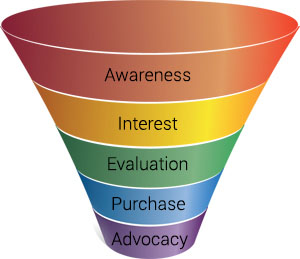I was recently talking with Taryn Reed, a Marketing Director at McKesson. She shared that she has a five-year plan for her marketing group. She’s a strategic marketer and makes sure her initiatives fit in with her well-thought-out, long-term purposes. I was impressed and asked her, “How many people in your organization are aware that you are thinking and planning five years ahead?”
If you are serious about results, like Taryn, then I know you have a formal plan, even if you are planning and projecting over the next 1 to 3 years.
You may not have thought of it in this light, but the success of your plan depends on buy-in from all sorts of people inside and outside of your team and organization. If you are serious about results, how effectively have you been sharing – and selling – your plan?
As the CMO of a tech business, I spend about a third of my time thinking about the marketing and sales funnel. Consequently, as my conversation with Taryn continued, I started thinking about the Sales and Marketing of Strategic Plans. Not just the grand ‘organization-wide’ type of plan, but the planning we often do for our own teams when we are serious about results. In other words, how important is it for Taryn, along with other business leaders, to market and sell plans for the future?
Maybe you are familiar with the traditional sales and marketing funnel. Maybe this is your first exposure to the model. Regardless, this brief outline should help you think about the steps to getting critical buy-in from everyone in your organization to assure plan success.

Awareness
The first step in evangelizing your plan is helping all stakeholders understand that there is a need for a plan within the organization. Give your team members more than an excel document with deliverables and KPIs. Give them clear and compelling reasons to engage with your plan, and involve them in the process if possible.
Key questions to ask in the Awareness Stage of selling your plan are:
Who needs to be aware of your plan? This could include the executive team, department leaders, or frontline staff. Making sure the right people are aware of the reasoning behind your plan is fundamental to its success. Focus on the “Why” of you your plan rather than the “What.” Strategy is more important than tactics at this stage of the funnel.
How can you share your plan to ensure engagement and understanding? If you are simply sending the plan as an email attachment, you are setting yourself up for failure. Ask to connect in-person to discuss the plan. Meet for coffee and ask for their reaction. Make your plan a collaborative, living document. When stakeholders feel fully aware and connected to the planning process, it makes the next stage of the funnel much easier.
Interest
Once you have made everyone aware of the need for a plan, and they have bought into your planning exercise, you will undoubtedly start to collaborate with multiple stakeholders around the plan. We all know though, humans are inherently self-interested. Be sure to balance the needs of stakeholders with the fundamental objectives of the plan.
Key questions to ask the in the Interest Stage of selling your plan are:
What does each stakeholder group have to gain from executing your plan? Is your plan designed to help individuals throughout the organization achieve departmental KPIs or individual goals? If you can convey tangible benefits (time-saving, upside attainment, etc.) to those executing the plan, you are much more likely to receive buy-in.
What does each stakeholder group have to lose from executing the plan? Plans could also have a negative impact on the day-to-day of your stakeholders. Will your new initiative require stakeholders to reallocate time from their other responsibilities? Worse yet, will they have to spend more hours in the office to execute what you are asking, at the expense of spending time with their family? If you are piling more responsibilities onto an already full plate, you are asking for pushback on your plan.

Evaluation
You’ve made everyone aware of the plan. You’ve made it a collaborative endeavor. And you’ve made sure that everyone has a personal reason to invest in the plan. But you have one last, major hurdle to overcome. Status quo. Businesses, and the stakeholders within them, are categorically resistant to change. Your job at this stage of the funnel is to assist everyone in evaluating the benefits of your plan versus the costs of doing business as usual.
Key questions to ask in the Evaluation Stage of selling your plan are:
Why would stakeholders choose business as usual over your plan proposal? There are a lot of reasons that the status quo persists within organizations. But most often, resistance stems from stakeholders feeling that their security or status is being threatened. Hopefully, your work in the interest stage of the funnel will mitigate these concerns, but it's an important consideration to keep in mind.
Are there perceived, viable, alternatives to your plan? Let’s say your plan addresses the organization’s need for an increased PR presence. But there is a capabilities/skills gap on your marketing team in regards to executing your new PR initiatives. Stakeholders may think bringing in a PR firm or consultant would be a more viable option. Don’t push these opinions to the side. Objection handling is crucial to obtaining plan buy-in, especially if you do not think bringing in an outside firm is in the best interest of your company long-term.
Purchase
If you have gotten to this stage of the funnel, your stakeholders are ready to give a go or no-go on your plan. And hopefully, you have aligned the plan with interests across the organization to obtain buy-in. The hurdle in this stage becomes a belief in the feasibility of implementing the plan. And ultimately, believe in you as the plan leader. Perception is a reality at this stage of the funnel.
Key questions to ask in the Decision Stage of selling your plan are:
How do stakeholders feel about the plan? There is an old adage, “People make emotional decisions for logical reasons.” Essentially, people will always trust their gut and justify their decisions using logic. If your plan doesn’t ‘feel right' to stakeholders, expect to hear logical rationalization as to why they cannot decide in favor of your plan.
Do stakeholders believe your plan will achieve its objective? A founding principle of goal setting is that any successful plan needs to be SMART. Specific, Measurable, Achievable, Relevant, and Time-bound. Even the best-laid plans go awry. If your stakeholders believe the plan is destined for failure, don’t expect the support of its implementation.
Bonus Tip - Don’t understate the importance of key stakeholder endorsements when trying to drive a favorable decision. A CEO friend of mine, who loves selling, once told me: Always ask for the order. If someone else’s support is essential to your success, have you asked for their public support?
Advocacy
Congratulations, if you have made it to the Advocacy Stage of selling your plan! You have obtained stakeholder approval and your plan is ready for implementation. Now your focus shifts away from plan creation to evangelism, advocacy, and implementation. Communication and accountability is key in this phase as you design a system to ensure plan results.
Looking for an easy way to communicate your plan throughout the organization and drive its successful completion?
👋
Meet the Author Joseph Krause
Joe has helped organizations execute thousands of strategic, operational, and project plans in his 10+ years at AchieveIt. Joe is passionate about helping teams drive successful business outcomes with a focus on practical, easy to use advice. Joe graduated from Seton Hall University with a Bachelor of Arts in political science and obtained a Masters of Science in Healthcare Communication from Boston University. Joe recently completed his studies at Rutgers University where he obtained a Masters in Business Administration with a concentration in finance.



